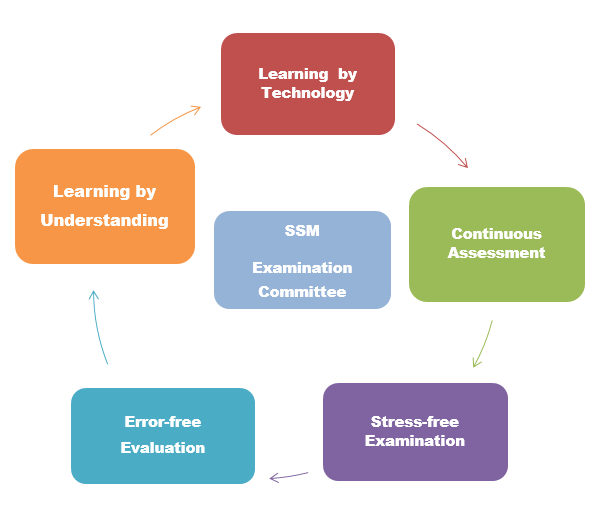
Dr. Vishal Mahajan
Coordinator
The Examination Committee stands as a cornerstone of excellence within our institution. As the highest administrative body of the college, it operates with unwavering dedication and allegiance, steadfastly committed to upholding the institution's mission and executing its duties with utmost efficiency year-round, guided by the principles and directives set forth by Guru Nanak Dev University, Amritsar. At the heart of its mandate lie several core responsibilities, each meticulously executed to ensure the seamless functioning of academic processes. Foremost among these duties is the conduct of house tests, a vital component of the assessment framework that enables students to gauge their progress and comprehension within a controlled environment. Through rigorous planning and execution, the Examination Committee orchestrates these assessments with precision and fairness, upholding the integrity of the evaluation process. In addition to house tests, the Committee shoulders the responsibility of crafting comprehensive date sheets, laying out the schedule for examinations and other academic activities with meticulous attention to detail. By coordinating with faculty members, department heads, and administrative staff, the Committee ensures that the timeline for examinations aligns seamlessly with the academic calendar, facilitating a structured and efficient learning environment for students.
Timeliness is of paramount importance to the Committee, as it endeavors to prepare and declare results promptly, adhering to predetermined deadlines and standards of accuracy. By leveraging advanced technology and streamlined processes, the Committee strives to deliver results in a timely manner, providing students with timely feedback and enabling them to plan their academic trajectories effectively. Moreover, the Committee plays a pivotal role in fostering engagement and collaboration between stakeholders through the organization of parent-teacher meetings. These forums serve as invaluable platforms for communication and dialogue, facilitating meaningful exchanges between educators, students, and parents, and nurturing a supportive learning community that prioritizes holistic student development. Beyond its internal responsibilities, the Examination Committee assumes full stewardship of the smooth conduct of university examinations, operating in alignment with the predetermined schedules and guidelines stipulated by the university. With meticulous planning and execution, the Committee ensures that all logistical and administrative arrangements are in place to facilitate the seamless administration of examinations, upholding the integrity and credibility of the assessment process. In essence, the Examination Committee epitomizes the ethos of excellence and commitment within our institution, steadfastly dedicated to the pursuit of academic integrity, efficiency, and student-centricity. Through its unwavering efforts, the Committee remains an indispensable asset, driving the advancement of our academic mission and the fulfillment of our collective aspirations.

| Sr. No. | Name | Designation |
|---|---|---|
| 1 | Dr. Vishal Mahajan | Coordinator |
| 2 | Dr. Shubh Kiran Sharma | Deputy Coordinator |
| 3 | Ms. Monika | Incharge of Science Section |
| 4 | Ms. Sushma Devi | Incharge of Arts Section |
| 5 | Mr. Rajat Mahajan | Incharge of Commerce Section |
| 6 | Dr. Rajan Handa | Incharge of Evaluation Section |
| 7 | Ms. Koshika | Incharge of Examination Record |
Reforms are carried out in the examination procedure to ensure a transparent and efficient examination system. Areas of improvement are identified through feedback mechanism and the Examination Committee initiates these reforms. The following reforms have been carried out since the past five years:
1. Fixed Schedule of Examination: The practice of setting and adhering to an Examination Schedule was initiated. The Examination Committee ensures a strict adherence to the schedule and the same is displayed in the college notice boards from time to time. It has brought transparency in the examination procedure and has ensured timely conduct of examination and publication of results.
2. Three-Tier Question Papers: The Mid Semester Examinations (MST) is conducted as per the academic calendar of the institution. Three sets of question papers are prepared for each course and placed in sealed covers before the commencement of examinations. On the day of examination, one hour prior to the examination, one set is picked at random for each course by the Head of the Institution and the examinations are conducted.
3. Error-free Evaluation: In order to ensure uniformity and standard in evaluation of answer scripts, an error free Evaluation is ensured .The senior faculty members discuss the question papers and a few answer scripts and decide a standard pattern of evaluation. This practice has ensured high standards in evaluation and has stamped a mark of authenticity to the results.
4. Comprehensive Result Analysis: The Examination Committee ensures a detailed analysis of the results .The Committee examines the results in the light of previous performance and provides some valuable insights into students’ performance and evaluation methods. Result analysis has ensured concentration on student performance and has been able to identify areas of improvement in teaching-learning methodology.
5. Revise, Review and Re-total: After the evaluation of the answer script by the evaluator, the paper is reviewed by the reviewer and the paper is then re-checked for correctness in case of any error and then marks are retotaled to remove errors. The procedure of retotaling of marks has led to an error free evaluation and quick publication of results. As a result of this procedure there has been a reduction in grievances and in application for re-evaluation and retotaling of marks.